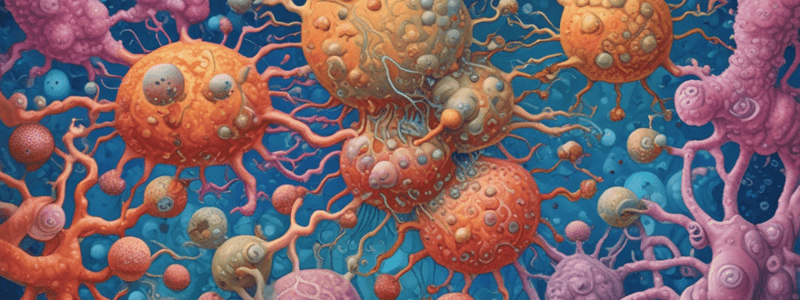Podcast
Questions and Answers
What is the main reason for the massive T-cell activation and release of large amounts of cytokines caused by superantigens?
What is the main reason for the massive T-cell activation and release of large amounts of cytokines caused by superantigens?
- They activate only a small fraction of T cells in the immune response
- They polyclonally activate a large fraction of T cells (correct)
- They enhance acquired immunity by promoting memory T-cell formation
- They are produced by viruses and bacteria to evade the immune system
Why do microbial antigens need to be transported to lymph nodes despite T cells mainly being present in lymphoid organs?
Why do microbial antigens need to be transported to lymph nodes despite T cells mainly being present in lymphoid organs?
- To prevent T-cell activation
- To enhance the chances of encounter with T cells (correct)
- To stimulate memory T-cell formation
- To increase the microbial antigen concentration in the blood
Which of the following is a characteristic of conventional T-dependent antigens compared to superantigens?
Which of the following is a characteristic of conventional T-dependent antigens compared to superantigens?
- Production by pathogenic viruses and bacteria
- Recognition by a small fraction of T cells leading to monoclonal/oligoclonal response (correct)
- Release of large amounts of cytokines causing systemic toxicity
- Polyclonal activation of a large fraction of T cells
What is the primary function of superantigens produced by some pathogenic viruses and bacteria?
What is the primary function of superantigens produced by some pathogenic viruses and bacteria?
Why do T cells need microbial antigens to be captured, processed, and presented in a specific way for interaction?
Why do T cells need microbial antigens to be captured, processed, and presented in a specific way for interaction?
What is the mechanism of uptake by immature dendritic cells?
What is the mechanism of uptake by immature dendritic cells?
Which mechanism leads to the uptake of exogenous antigens through Fc receptor mediation?
Which mechanism leads to the uptake of exogenous antigens through Fc receptor mediation?
What is the purpose of antigen processing in relation to T cell recognition?
What is the purpose of antigen processing in relation to T cell recognition?
Which antigen presentation pathway involves MHC class II molecules?
Which antigen presentation pathway involves MHC class II molecules?
Where does the association of peptides with MHC molecules occur during antigen processing?
Where does the association of peptides with MHC molecules occur during antigen processing?
What is the role of APCs in antigen presentation?
What is the role of APCs in antigen presentation?
What is the main function of MHC class I molecules?
What is the main function of MHC class I molecules?
Which cell types are included in the group of Professional Antigen Presenting Cells (APC)?
Which cell types are included in the group of Professional Antigen Presenting Cells (APC)?
Why is the distribution of MHC class II expression restricted to Antigen Presenting Cells (APCs)?
Why is the distribution of MHC class II expression restricted to Antigen Presenting Cells (APCs)?
What is the role of T cells in responding to antigens?
What is the role of T cells in responding to antigens?
Which feature is characteristic of peptides binding to MHC molecules?
Which feature is characteristic of peptides binding to MHC molecules?
What is the primary determinant of tissue graft acceptance or rejection?
What is the primary determinant of tissue graft acceptance or rejection?
Which type of antigens are generated within cells due to normal cell metabolism or intracellular infections?
Which type of antigens are generated within cells due to normal cell metabolism or intracellular infections?
Which of the following is an example of endogenous antigen?
Which of the following is an example of endogenous antigen?
What is the function of superantigens?
What is the function of superantigens?
Which antigens are recognized by the immune system in patients with autoimmune diseases?
Which antigens are recognized by the immune system in patients with autoimmune diseases?
What is the function of histocompatibility antigens?
What is the function of histocompatibility antigens?
What is the main purpose of antigen transport to the lymph node?
What is the main purpose of antigen transport to the lymph node?
Which class of antigens results in massive cytokine release due to polyclonal T cell activation?
Which class of antigens results in massive cytokine release due to polyclonal T cell activation?
During antigen uptake, where do the antigens enter mainly?
During antigen uptake, where do the antigens enter mainly?
What occurs during the process of antigen degradation?
What occurs during the process of antigen degradation?
Why is it essential for immature dendritic cells (DCs) to migrate to draining lymph nodes?
Why is it essential for immature dendritic cells (DCs) to migrate to draining lymph nodes?
What is the main difference in membrane protein expression between immature and mature DCs?
What is the main difference in membrane protein expression between immature and mature DCs?
Which statement best describes antigen presentation to T cells?
Which statement best describes antigen presentation to T cells?
Flashcards are hidden until you start studying




